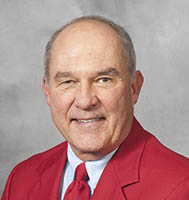Philip Farrell, MD, PhD
Position title: Emeritus Dean, Professor
Address:
Division of Pulmonology & Sleep Medicine
For Academic Inquiries: (608) 262-7310

Education
BA, St. Louis University, St. Louis, Missouri
MD/PhD, St. Louis University, St. Louis, Missouri
Residency, Pediatrics, University of Wisconsin, Madison, Wisconsin
Fellowship, Pulmonology and Neonatology, National Institutes of Health, Bethesda, Maryland, George Washington University, Washington, District of Columbia
Fellowship, Developmental Biology Fogarty Senior International Fellowship Award, National Institutes of Health, College de France, Paris, France
Fellowship, Epidemiology, University of Michigan, Ann Arbor, Michigan, London School of Hygiene and Tropical Medicine, London, England
Docteur Honoris Causa, Genetics, Université de Bretagne Occidentale, Brest, France
Professional Activities
Dr. Philip Farrell is emeritus dean and professor in the Departments of Pediatrics and Population Health Sciences at the UW School of Medicine and Public Health. Over the past four decades, Farrell has investigated the benefits, risks, tests, and costs of early diagnosis of cystic fibrosis (CF) through newborn screening. The stimulus for this unique investigation, initiated in 1984, came from Farrell’s experiences practicing neonatology and pediatric pulmonology concurrently. The initiative’s results led to nationwide screening for CF by 2010, with most states using the immunoreactive trypsinogen (IRT) and DNA method developed in Wisconsin. This was the first U.S. population-based application of molecular genetics testing.
Farrell has received several awards for his groundbreaking work. Notable awards include the Joseph B. Goldberger Award in Clinical Nutrition from the American Medical Association, the Paul di Sant’Agnese Distinguished Scientific Achievement Award from the U.S. Cystic Fibrosis Foundation, the Edwin L. Kendig Award from the American Academy of Pediatrics and American College of Chest Physicians, and the George Cunningham Visionary Award in Newborn Screening from the Association of Public Health Laboratories.
Since 2007, Farrell has led national research efforts devoted to quality improvement in the operation of CF newborn screening programs in collaboration with the Cystic Fibrosis Foundation and Centers for Disease Control and Prevention (CDC). Currently, he participates in a national initiative addressing equity and timeliness issues, particularly for the 20% of CF patients who are non-white.
Farrell has an affiliate appointment in the Department of Population Health Sciences.
Clinical Interests
Farrell’s clinical interests focus on CF. He is also interested in other respiratory disorders of pediatric patients caused by genetic mutations such as desquamative interstitial pneumonitis and primary ciliary dyskinesia (PCD). Recently, Farrell has developed a clinical interest in Angelman syndrome while collaborating with Dr. Mei Baker, professor in the Division of Genetics and Metabolism.
Research Interests
Farrell’s project on CF newborn screening is currently focused on applying whole genome sequencing designed to determine its potential added value in newborn screening using DNA specimens isolated from a well-characterized cohort of children and adults with CF.
Farrell collaborates in Feeding Infants Right… from the STart (FIRST), a multicenter clinical study investigating how best to feed infants with CF and how malnutrition contributes to later lung disease. Additionally, he contributes to a project uncovering when and why the principal cystic fibrosis transmembrane conductance regulator (CFTR) mutation, F508del, arose in western Europe and what the selective advantage is for the F508del heterozygote carrier. This team discovered that the oldest common ancestor lived about 5,000 years ago along the Atlantic Ocean and that F508del then spread to central and southeastern European populations.